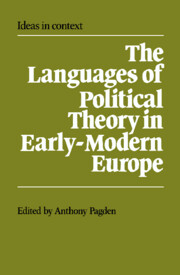Book contents
- Frontmatter
- Contents
- Notes on contributors
- Acknowledgements
- Introduction
- 1 The concept of a language and the métier d'historien: some considerations on practice
- PART I
- 2 The history of the word politicus in early-modern Europe
- 3 Civil science in the Renaissance: the problem of interpretation
- 4 Dispossessing the barbarian: the language of Spanish Thomism and the debate over the property rights of the American Indians
- 5 The ‘modern’ theory of natural law
- PART II
- PART III
- PART IV
- Index
- Ideas in Context
5 - The ‘modern’ theory of natural law
Published online by Cambridge University Press: 04 September 2009
- Frontmatter
- Contents
- Notes on contributors
- Acknowledgements
- Introduction
- 1 The concept of a language and the métier d'historien: some considerations on practice
- PART I
- 2 The history of the word politicus in early-modern Europe
- 3 Civil science in the Renaissance: the problem of interpretation
- 4 Dispossessing the barbarian: the language of Spanish Thomism and the debate over the property rights of the American Indians
- 5 The ‘modern’ theory of natural law
- PART II
- PART III
- PART IV
- Index
- Ideas in Context
Summary
It is a familiar observation that the late eighteenth century in Europe witnessed one of the greatest revolutions which has ever occurred in the writing of philosophy. The novelty of the views of Kant and his followers was obvious to contemporaries, and has been a truism in the historiography of philosophy to this day. What is not so familiar is that the writing of the history of philosophy was transformed at the same time, and that it has remained in its new form ever since. In order to vindicate his own philosophy, Kant was located by both himself and his successors in a new version of the history of philosophy, sweeping away what had been commonplaces for more than a century. The transformation was most complete in the area of modern moral philosophy, for there not only did an old interpretation vanish, but so did a complete cast of characters. Given Kant's own views, this was understandable, but the survival of the post-Kantian history into our own time has proved a great barrier to a genuine understanding of the pre-Kantian writers. What I want to do in this essay is outline the history of recent moral philosophy which Kant rejected and seek to understand why it seems to the men of the Enlightenment to be such a powerful and obvious account of their origins.
- Type
- Chapter
- Information
- The Languages of Political Theory in Early-Modern Europe , pp. 99 - 120Publisher: Cambridge University PressPrint publication year: 1987
- 80
- Cited by



